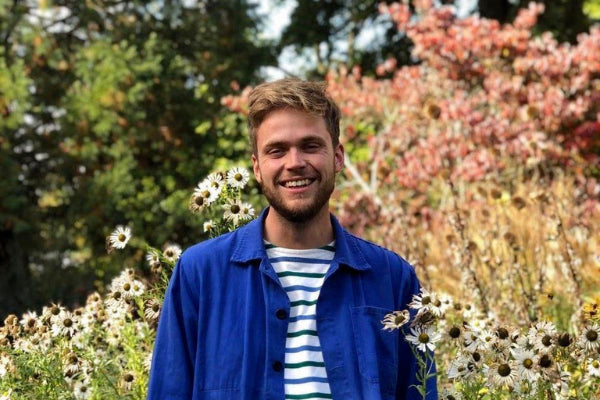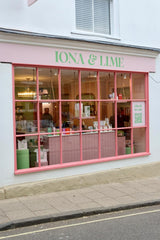Q&A With Award-winning Garden Designer Freddie Strickland
Posted by TEAM WILD BEAUTY

The RHS Chelsea Flower Show traditionally heralds the official arrival of Spring! We took a moment to talk to award-winning garden designer Freddie Strickland.
Freddie, who studied garden design in Cornwall, was named RHS Young Garden Designer of the Year in 2021, winning Gold for his ‘On Tropic’ show garden at Tatton Park. His innovative design addressed low impact gardening and the effect of climate change on UK gardens – something he kindly explained in more detail in our recent conversation.
Freddie, who studied garden design in Cornwall, was named RHS Young Garden Designer of the Year in 2021, winning Gold for his ‘On Tropic’ show garden at Tatton Park. His innovative design addressed low impact gardening and the effect of climate change on UK gardens – something he kindly explained in more detail in our recent conversation.
As a born and bred Londoner, what led you to Cornwall to study horticulture?
I initially moved to Cornwall to study fine art at university – I think I always felt slightly disconnected from London so the move to a rural, coastal area was very natural for me. At that point I knew nothing about gardening, and it wasn’t until I had my own garden that I wanted to learn more about it. I therefore ended up, post degree, enrolling on a 2-year Garden Landscape course at the Eden Project.
The Eden Project, with its biome in the middle of the countryside, was a ground-breaking installation. Does it apply its forward-thinking ideas to its Garden Landscape course?
The Eden Project really is a huge contrast to the more formal landscaped gardens of the many historic houses found in Cornwall. It is most definitely the next level in terms of experimental horticulture. The team places a big emphasis on sustainability and environmentally friendly practices – this includes reusing water and composting all tourist generated food waste to bring it back to the soil. As a result, we explored these practices on a daily basis and they became an inherent part of the course.
I initially moved to Cornwall to study fine art at university – I think I always felt slightly disconnected from London so the move to a rural, coastal area was very natural for me. At that point I knew nothing about gardening, and it wasn’t until I had my own garden that I wanted to learn more about it. I therefore ended up, post degree, enrolling on a 2-year Garden Landscape course at the Eden Project.
The Eden Project, with its biome in the middle of the countryside, was a ground-breaking installation. Does it apply its forward-thinking ideas to its Garden Landscape course?
The Eden Project really is a huge contrast to the more formal landscaped gardens of the many historic houses found in Cornwall. It is most definitely the next level in terms of experimental horticulture. The team places a big emphasis on sustainability and environmentally friendly practices – this includes reusing water and composting all tourist generated food waste to bring it back to the soil. As a result, we explored these practices on a daily basis and they became an inherent part of the course.
What do you consider your greatest achievement to date?
I’m very grateful to be in an industry which I found against the odds. Most people discover horticulture later in life, so I am just so happy to have found it when I did.
How do you bring sustainability into your designs and how can we do the same in our own garden spaces?
Always try to think about the soil and wildlife – consider plants that help the soil retain water and increase the canopy for cooling and shading. I always try and think how a garden can be more sustainable, encouraging biodiversity and wildlife. This could be through leaving an area of meadow or planting more trees. In my designs, I am increasingly incorporating less grass and more planting – balancing spaces for people and wildlife is always in my mind. Water preservation is a key consideration – how can I slow down and capture water? This could be through adding a pond or a water butt or creating a rain garden. I also believe anyone can use reclaimed materials whether it be on a balcony or in a big garden. I veer towards natural materials such as timber and quarried stone, avoiding concrete, and try to source it locally where possible. Always remember though, if you are gardening you are already doing brilliantly, but always try and make sustainable choices where possible.
I’m very grateful to be in an industry which I found against the odds. Most people discover horticulture later in life, so I am just so happy to have found it when I did.
How do you bring sustainability into your designs and how can we do the same in our own garden spaces?
Always try to think about the soil and wildlife – consider plants that help the soil retain water and increase the canopy for cooling and shading. I always try and think how a garden can be more sustainable, encouraging biodiversity and wildlife. This could be through leaving an area of meadow or planting more trees. In my designs, I am increasingly incorporating less grass and more planting – balancing spaces for people and wildlife is always in my mind. Water preservation is a key consideration – how can I slow down and capture water? This could be through adding a pond or a water butt or creating a rain garden. I also believe anyone can use reclaimed materials whether it be on a balcony or in a big garden. I veer towards natural materials such as timber and quarried stone, avoiding concrete, and try to source it locally where possible. Always remember though, if you are gardening you are already doing brilliantly, but always try and make sustainable choices where possible.




